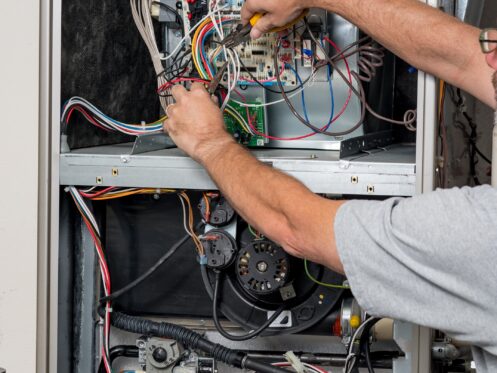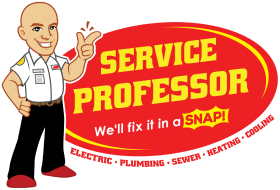When it comes to major home repairs, following building codes isn’t just a recommendation-it’s a legal requirement. Plumbing, electrical, and HVAC systems must meet strict safety and efficiency standards to ensure homes are safe and functional. Failing to comply with these codes can lead to costly and even dangerous consequences. Calling the licensed HVAC, plumbing, and electrical professionals at Service Professor can save you a bigger headache down the road.
Contact us today to book an appointment or read on to learn more about home services’ code compliance.
Here’s what can happen if your home repairs are not up to code:
1. Legal Penalties and Fines
West Michigan municipalities enforce strict building codes for plumbing, electrical, and HVAC work. If an inspector discovers that work was done without permits or not up to code, you may face:
- Fines and penalties for unpermitted work
- Mandatory rework by a licensed contractor, often at your expense
- Stop-work orders preventing further renovations until code violations are resolved
2. Home Insurance May Be Voided
Insurance companies require that all home systems meet safety and building codes. If you file a claim for damage related to faulty electrical, plumbing, or HVAC repairs, your insurer may:
- Deny your claim because the work was not done by a licensed professional
- Refuse coverage for fire, water damage, or gas leaks caused by improper installations
- Cancel your policy if they discover unauthorized repairs during an inspection
3. Major Safety Risks
Non-code-compliant repairs don’t just affect property values—they can be life-threatening.
Plumbing Hazards:
- Cross-contamination of drinking water due to improperly installed pipes
- Sewage backups from incorrect drainage systems
- Burst pipes and flooding from poorly connected or pressurized plumbing
Electrical Hazards:
- Electrocution risks from exposed or improperly grounded wires
- Power surges damaging appliances and electronics
HVAC Hazards:
- Carbon monoxide poisoning from faulty gas lines or improperly vented furnaces
- Mold growth and air quality issues from poor ductwork installation
4. Lower Home Value & Issues When Selling
If your home has unpermitted or non-code-compliant work, selling it can be a nightmare:
- Failed Home Inspections: Buyers may demand that code violations be fixed before closing.
- Lower Property Value: Buyers may negotiate a lower price or back out due to the risks of non-compliant systems.
- Legal Liabilities: If undisclosed code violations cause future damage or injury, the previous homeowner (you) may be held responsible.
5. Costly Repairs & Replacements
Cutting corners on DIY plumbing, electrical, or HVAC work often leads to expensive problems down the road.
Examples of Costly Fixes:
- Rewiring an unsafe electrical panel ($3,000 – $10,000)
- Repairing water damage from a burst pipe ($5,000 – $20,000)
- Replacing an HVAC system due to poor installation ($4,000 – $12,000)
While hiring a professional may seem costly upfront, it prevents even more expensive fixes later.
Always Prioritize Safety & Compliance
Plumbing, electrical, and HVAC work that isn’t up to code can lead to:
- ❌ Legal trouble & fines
- ❌ Voided insurance policies
- ❌ Severe safety hazards
- ❌ Lower home value & resale problems
- ❌ Expensive repairs & replacements
To protect your home, family, and finances, hire a licensed professional and obtain the proper permits for any major repairs or upgrades. Cutting corners today can lead to devastating consequences tomorrow.
When it comes to home repairs, always do it right the first time!
In West Michigan, as in the rest of the state, adhering to building codes for plumbing, electrical, and HVAC systems is not only essential for safety but also a legal requirement. Non-compliance can lead to significant penalties, including fines and potential imprisonment.
Legal Penalties for Code Violations
- Misdemeanor Charges: Knowingly violating building codes or related regulations can result in misdemeanor charges. Penalties may include fines up to $500, imprisonment for up to 90 days, or both.
- Civil Fines: Performing work without the necessary licenses, such as those required for residential builders or specialized contractors, can lead to civil fines ranging from $100 to $500.
Local Enforcement and Additional Costs
Local municipalities in West Michigan enforce these codes and may impose additional fines or penalties. For instance, in Grand Haven, individuals found responsible for municipal civil infractions related to building codes may be assessed fines and the costs of prosecution.
Importance of Compliance
Ensuring that all plumbing, electrical, and HVAC work complies with state and local codes is crucial to avoid these penalties. It’s advisable to consult with local building authorities or licensed professionals before undertaking any significant work on your property.
By adhering to the established codes and regulations, you can maintain the safety of your home and avoid the financial and legal repercussions associated with code violations.
If you’re unsure about handling a home repair, err on the side of caution and call a licensed expert from Service Professor. HVAC, plumbing, and electrical systems are complex, and attempting to fix them without the right training can lead to bigger problems, higher costs, and safety risks.

